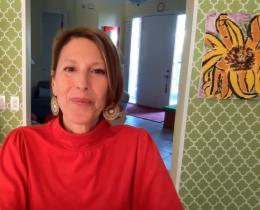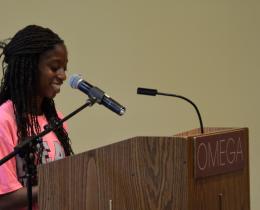Omega: What’s one thing you wish you'd learned about creativity early in your career?
Nancy: It would have been nice to know that anything is okay and that there’s no right and wrong with creativity. A tree can be magenta—it doesn’t have to be green. Writing doesn’t have to sound like Shakespeare.
I did get validation for my writing early on. I wrote a poem for my mom when I was probably seven, and it’s the first thing I remember. I have a sister named Margie, but I don't have a brother. My poem was: “Happy birthday to mom, to mom. From Margie and Nancy and Tom and Tom.”
My mother looked at me and she looked at the poem. She read it out loud, and she said, “Oh, honey. This is wonderful, but who’s Tom?”
I looked at her like how could she not know?
I said, “It rhymes with mom.”
She just lit up and said, “Oh, of course!”
She could’ve nipped the little writer in the bud and said, "You can’t do that!" But she didn't. She validated me and I learned that you can mess around and you don’t have to be accurate.
Omega: Who was your biggest influence or advocate for pursuing a writing life?
Nancy: J.D. Salinger. When I read his stuff, it was the first time I knew I could write, because he sounded like a regular person, too. He didn’t sound like Shakespeare, and he didn’t sound intelligent with big words, and he didn’t sound like “a writer.” I was probably in junior high or high school at that time. I was blown away by his Nine Stories. He was basically the first one that made me feel like I could write.
My father was an influence, too. He wrote a lot of poetry that was very funny and rhyming. He wrote on the backs of envelopes, and they were all over the floor, or he lost them, He never thought of himself as a writer. When I first started writing, that’s what I would do. I wrote on the backs of things and on little scraps of paper, and never honored it, never collected it, never put it in one place, never had a folder. It was way before computers, so there was no way of saving anything.
It wasn’t until I was 40 that I realized I was doing what my father had done. I was all over the place. I hadn’t really taken anything seriously. I knew I was good, and I knew I loved it, and I knew that I could whip stuff off that was original, but I did not ever have a model for honoring my creativity.
Omega: You’ve been teaching writing workshops in beautiful places for more than 25 years. Do you think where you write impacts your output?
Nancy: Someone took a workshop from me many, many years ago and she had a major life transformation. The next summer she invited me over for dinner. After dinner, she said, “I have a surprise for you,” and took me by the hand. Our husbands followed us down to this adorable, beautiful, curvy, wooded area outdoors and there appeared this incredible studio that her husband had built her. On the way home I was crying, saying, “I need a studio.”
My husband said, “Really? Is that what makes a writer?”
I thought back to the times that I had written the best stuff. It was when I didn’t have a good journal, I didn’t have a good studio, the kids were crawling all over me, I was folding laundry, and I was writing.
Location is nice because there’s beauty, but it has nothing to do with writing. I don’t think that it’s the muse.




